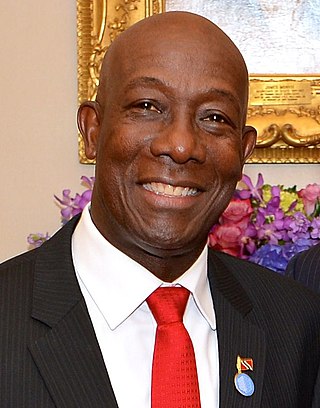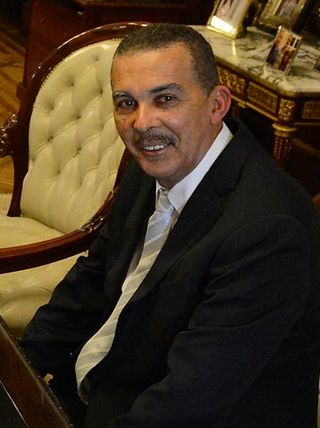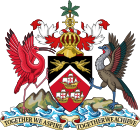
The politics of Kazakhstan takes place in the framework of a presidential republic, whereby the President of Kazakhstan is head of state and nominates the head of government. Executive power is exercised by the government. Legislative power is vested in both the government and the two chambers of parliament.

The politics of Trinidad and Tobago function within the framework of a unitary state regulated by a parliamentary democracy modelled on that of the United Kingdom of Great Britain and Northern Ireland, from which the country gained its independence in 1962. Under the 1976 republican Constitution, the monarch was replaced as head of state by a President chosen by an electoral college composed of the members of the bicameral Parliament, consisting of the Senate and the House of Representatives.

The politics of Fiji take place within the framework of a parliamentary representative democratic republic. Fiji has a multiparty system with the Prime Minister of Fiji as head of government. The executive power is exercised by the government. Legislative power is vested in both the government and the Parliament of Fiji. The judiciary is mostly independent of the executive and the legislature.

The politics of Barbados function within a framework of a parliamentary republic with strong democratic traditions; constitutional safeguards for nationals of Barbados include: freedom of speech, press, worship, movement, and association.
An electoral college is a set of electors who are selected to elect a candidate to particular offices. Often these represent different organizations, political parties or entities, with each organization, political party or entity represented by a particular number of electors or with votes weighted in a particular way.
A member of parliament (MP) is the representative in parliament of the people who live in their electoral district. In many countries with bicameral parliaments, this term refers only to members of the lower house since upper house members often have a different title. The terms congressman/congresswoman or deputy are equivalent terms used in other jurisdictions. The term parliamentarian is also sometimes used for members of parliament, but this may also be used to refer to unelected government officials with specific roles in a parliament and other expert advisers on parliamentary procedure such as the Senate Parliamentarian in the United States. The term is also used to the characteristic of performing the duties of a member of a legislature, for example: "The two party leaders often disagreed on issues, but both were excellent parliamentarians and cooperated to get many good things done."

The Inter-American Court of Human Rights is an international court based in San José, Costa Rica. Together with the Inter-American Commission on Human Rights, it was formed by the American Convention on Human Rights, a human rights treaty ratified by members of the Organization of American States (OAS).

The vice president of India is the deputy to the head of state of the Republic of India, i.e. the president of India. The office of vice president is the second-highest constitutional office after the president and ranks second in the order of precedence and first in the line of succession to the presidency. The vice president is also a member of the Parliament of India as the ex officio chairman of the Rajya Sabha.

Arthur Napoleon Raymond Robinson, was the third President of Trinidad and Tobago, serving from 19 March 1997 to 17 March 2003. He was also Trinidad and Tobago's third Prime Minister, serving in that capacity from 18 December 1986 to 17 December 1991. He is recognized for his proposal that eventually led to the founding of the International Criminal Court.
Karl Terrence Hudson-Phillips, ORTT, QC was an Attorney-General of Trinidad and Tobago and a judge of the International Criminal Court. He was also lead counsel in the murder trial of Grenadian Prime Minister Maurice Bishop.

Elections in Trinidad and Tobago gives information on election and election results in Trinidad and Tobago.
Gillian Lucky is a Justice of Appeal at the Supreme Court of Judicature for Trinidad and Tobago. She was previously a High Court Judge, Director of the Police Complaints Authority, and a Member of Parliament for Pointe-à-Pierre.

The eighteen judges of the International Criminal Court (ICC) are elected for nine-year terms by the member-countries of the court. Candidates must be nationals of those countries and they must "possess the qualifications required in their respective States for appointment to the highest judicial offices".

Keith Christopher Rowley is a Trinidadian and Tobagonian politician serving as the seventh prime minister of Trinidad and Tobago, first elected into office on 9 September 2015 and again following the 2020 general election. He has led the People's National Movement (PNM) since May 2010 and was Leader of the Opposition from 2010 to 2015. He has also served as the Member of the House of Representatives for Diego Martin West since 1991. He is a volcanologist by profession, holding a doctorate in geology, specializing in geochemistry.
Six judges of the International Criminal Court were elected during the 10th session of the Assembly of States Parties to the Rome Statute of the International Criminal Court in New York between 12 and 21 December 2011. The judges elected, Anthony Carmona of Trinidad and Tobago, Miriam Defensor Santiago of the Philippines, Chile Eboe-Osuji of Nigeria, Robert Fremr of the Czech Republic, Olga Venecia Herrera Carbuccia of the Dominican Republic and Howard Morrison of the United Kingdom, took office on 11 March 2012.

Anthony Thomas Aquinas Carmona is a Trinidadian politician who was the fifth President of Trinidad and Tobago, from 2013 to 2019. Previously he was a High Court Judge at the Supreme Court of Trinidad and Tobago, and he served as a Judge of the International Criminal Court from 2012 to 2013.
Trinidad and Tobago was admitted to the United Nations by the General Assembly on September 18, 1962, as advised by the United Nations Security Council Resolution 175.
The Hugh Wooding Law School (HWLS) is a law school in Trinidad and Tobago.
A special election for one judge of the International Criminal Court was held during the 12th session of the Assembly of States Parties to the Rome Statute of the International Criminal Court which took place in The Hague from 20 to 28 November 2013.

Indirect presidential elections were held in Trinidad and Tobago on 19 January 2018.












